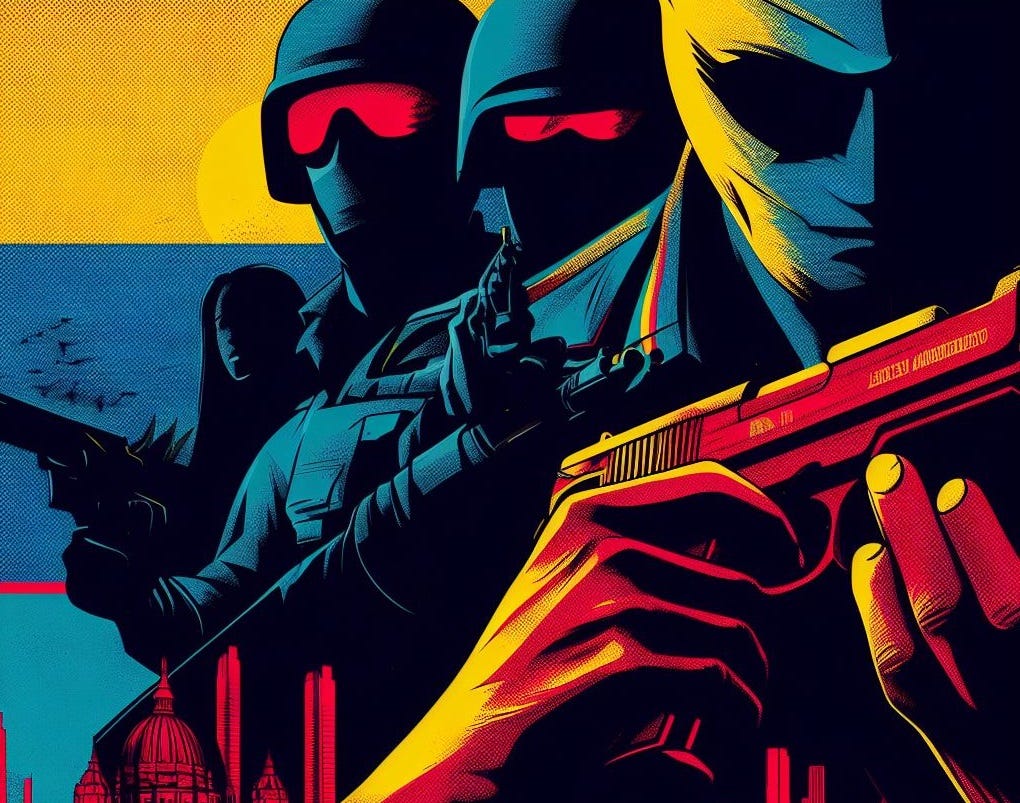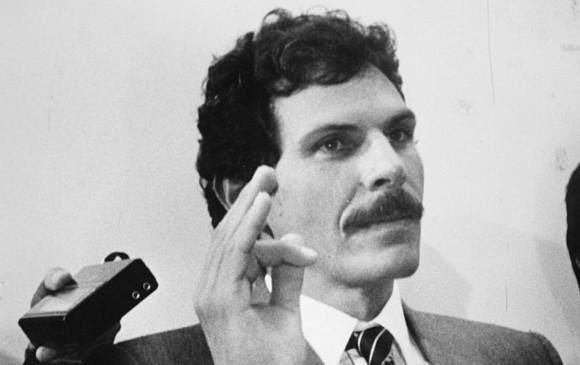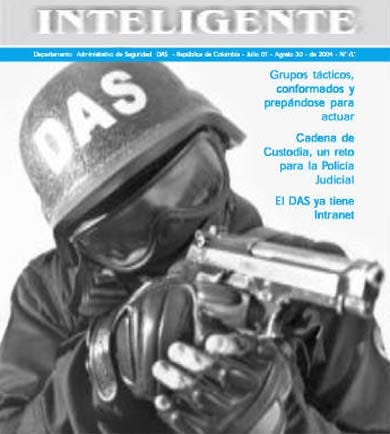New conviction sheds light on just how bad Colombian Intelligence Agency DAS really was
DAS agent convicted of participating in plot to assassinate presidential candidate, then killing the hitman
This week’s feature is by Colombian journalist Nícolas Zuluaga
Bogotá, Colombia—In the political annals of Colombia's history, few figures have left as profound a mark as Carlos Pizarro— who went from a militant in the M-19 guerilla movement to a presidential candidate who was ultimately gunned down aboard an airplane in an operation that implicated Colombia’s infamous intelligence service, the Administrative Department of Security (DAS)
A recent ruling by a judicial body in Colombia created as part of the country’s 2016 peace deal, the Special Jurisdiction for Peace (JEP by its Spanish initials), against Jaime Ernesto Gómez Muñoz, former DAS-provided bodyguard for presidential candidate Carlos Pizarro, sheds new light on a dark chapter of the nation's history.
On September 26, 2023, the JEP through the Attorney General's Office formally accused Muñoz of the crimes of conspiracy, illegal possession of weapons, and aggravated homicide for terrorist purposes in the killing. Muñoz was one of two DAS-provided bodyguards responsible for the security of Carlos Pizarro while he was a presidential candidate in 1990.
From Militant Revolutionary to Presidential Candidate
Carlos Pizarro, born on February 4, 1951, in Cartagena, Colombia, grew up in a country plagued by political turmoil, poverty, and social inequality. He became politically active during his university years. He was expelled from Javeriana University for organizing the college’s first student strike and later entered the National University of Colombia before dropping out to join guerilla group the Revolutionary Armed Forces of Colombia (FARC), during Colombia’s civil war. However, it was his involvement with the 19th of April Movement (M-19) that would ultimately define his life.
M-19 emerged in the 1970s as a response to perceived social injustices and political corruption of Colombia’s two ruling parties and also disagreements with more established guerrilla groups the FARC and the ELN. During his time in the movement, Pizarro advocated for political change through armed struggle as part of a rebel group known for its urban warfare tactics and political kidnappings. Pizarro was a key leader, rising through the ranks due to his charisma and strategic acumen. Under his leadership, M-19 carried out high-profile actions, such as the takeover of the Dominican Republic's embassy in Bogotá in 1980 and the famous Seige of the Palace of Justice, Colombia’s Supreme Court, in 1985— an armed standoff that ultimately resulted in the deaths of the judges, dozens of hostages, and most of M-19.
Later as the guerilla movement transitioned away from armed conflict, Pizarro did so as well. In 1990 M-19 disarmed to pursue a peaceful, political path as an alternative political party named Alianza Democrática M-19. This transformation was part of a broader movement in Colombia toward ending a decades-long cycle of violence and addressing the country's deep-seated issues through negotiation with the rebel groups fighting in Colombia’s then-ongoing civil war.
Spy Agency Involvement in Pizarro’s Assassination
Following M-19's demobilization, Pizarro ran for the presidency in the 1990 elections. His campaign was seen as a testament to Colombia's commitment to peaceful change. Pizarro’s death played a crucial role in the country's writing a new constitution in 1991, which sought to address many of Colombia's social and political problems.
On April 26th, 1990, Pizzaro boarded Avianca Flight 203 from Bogotá to Barranquilla escorted by two bodyguards from the DAS.
At the time, Bogotá’s airport security was under extreme surveillance and in a state of high-security alert. Just a month prior, Bernardo Jaramillo Ossa, another presidential candidate from Unión Patriótica (Patriotic Union), a leftist political party founded by the FARC and the Colombian Communist Party in 1985, was killed by a hitman at the airport while being escorted by sixteen DAS bodyguards.
Midflight, Gerardo Gutiérrez Uribe, referred to as “Jerry” by police, retrieved a submachine gun from the plane's restroom and opened fire, shooting Pizzaro multiple times in the back. DAS bodyguards killed the hitman on the spot. Pizzaro died a few hours later in an emergency room hospital.
In addition to accusations that DAS may have conspired to allow the assassin to smuggle a weapon on board, prosecutors also questioned how one of the two DAS bodyguards that accompanied Pizarro in Avianca Flight 203. Jaime Ernesto Gómez, a rookie who had barely passed his DAS graduation exams, was assigned to Pizaaro’s detail just a week before the flight.
The Attorney General's Office formally accused Jaime Ernesto Gómez Muñoz of crimes of conspiracy, illegal possession of weapons, and aggravated homicide for terrorist purposes. The Attorney General's Office investigation results concluded that Jaime Ernesto Gómez Muñoz shot “Jerry” to silence him from revealing the mastermind of the murder plot— witness reports confirmed Jerry had already left the submachine gun he used on the floor and raised his hands in a sign of surrender. The JEP also accuses DAS of killing suspects who had surrendered after the murders of several other political leaders at the time, such as in the case of Bernardo Jaramillo.
Following the conviction of the DAS bodyguard, Colombia’s prosecutor’s office announced on September 2023, that they will open a new investigation into DAS ex-director, Miguel Maza Márquez, who is currently serving a 30-year prison sentence for his participation in Luis Carlos Galan’s assassination in 1989. Galan was another prominent political figure at the time; a politician committed to social reform and his fierce stance against the powerful drug cartels. Galán's fearless denunciation of the drug traffickers epitomized his famous phrase "Neither surrender nor submission," which made him a beacon for a Colombian population besieged by drug-related violence and political corruption.
On August 18, 1989, during a political rally in the city of Soacha, near Bogotá. Galan was shot and killed by gunmen while addressing a crowd of supporters.
Rampant State Abuse: from Murder to Domestic Espionage
DAS was founded in 1960 to combat espionage, drug trafficking, and terrorism threats as well as immigration and passport control services.
However, over the years, the DAS became notorious for its involvement in activities that went far beyond its official mandate. It became embroiled in human rights abuses, political espionage, and the systematic suppression, and even torture, of political opponents and journalists, which ultimately led to its disbandment in 2011. DAS was implicated in the murder of journalist Jaime Garzón and multiple spying scandals against both domestic and foreign journalists such as Claudia Julieta Duque. Duque faced persistent persecution, harassment, and threats from Colombian Intelligence as retaliation for her investigative reporting on issues related to human rights abuses and government misconduct.
Former senator Piedad Córdoba and current Colombian president, Gustavo Petro, were victims of the DAS spying apparatus— and targets of illegal surveillance. DAS members have also been convicted by the JEP of aggravated kidnapping and homicide of demobilized M-19 members, in March 1994.
Since the disbandment of the DAS, the Colombian State has taken steps to address the crimes committed by the agency and provide justice for its victims by bringing transparency and accountability to legal and human rights abuses committed by Colombian intelligence services.
Colombia also established the creation of new oversight investigators within the JEP to investigate and prosecute cases related to human rights abuses and crimes committed by the DAS and the exhumation and identification task units to search cases where individuals were disappeared or killed by the DAS, efforts have been made to locate and identify their remains.
The Big Headlines in Latin America
The 7 Colombian men accused of assassinating presidential candidate Fernando Villavicencio in Ecuador in August, were all killed this week in the prisons where they were held. Six of the men were killed during a prison riot on Friday, and the seventh, and final prisoner was killed the following day.
Police did not release details on the seventh killing, but in a statement announced the firing of two top police and prison officials who they claimed were responsible for the lapse in security.
It is widely assumed the men were killed to prevent them from testifying in court.
Guatemala has been rocked by six days of protests demanding the resignation of Attorney General Consuelo Porras. Porras, who has been denounced in corruption investigations in the past, has been instrumental in trying to undermine the legitimacy of president-elect Bernardo Arevalo— ordering raids on the office of his party Semilla and seizing electoral ballots.
Arevelo won elections in a landslide in August, but has faced numerous challenges from political elites— efforts to overturn election results have been condemned by the international community as well as the Organization of American States.
Spanish Word of the Week
El que nada debe, nada teme- He who owes nothing, fears nothing
The phrase refers to someone who has a clear conscience. When someone accuses you of something bad you are not responsible for, you might use this phrase.
DAS in Colombia however, owed much, although fear doesn’t really have seemed to have been their style.
Luckily for us, the only debts we have at PWS are financial. Buy us a coffee and sign up! It’s only $5/month!







Some will be shocked to learn that the history of the world is bigger than the USA and Europe.